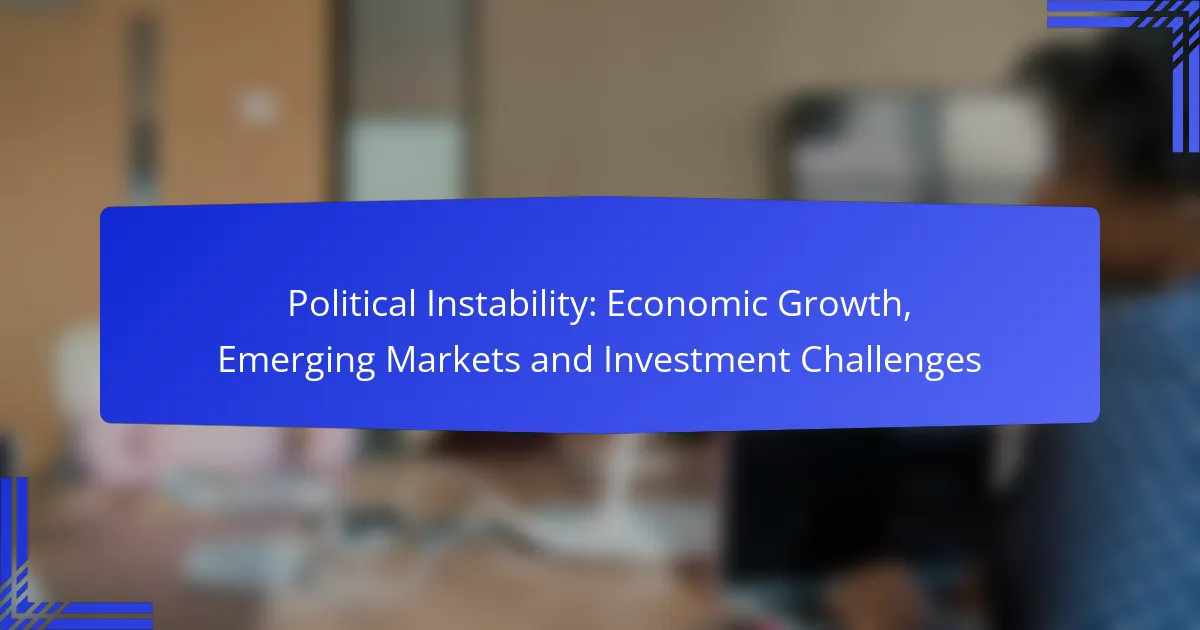Political instability poses a significant barrier to economic growth, creating an unpredictable landscape that deters investment and disrupts trade. In emerging markets, the interplay of political, economic, and infrastructural challenges further complicates the investment climate, making it essential for investors to navigate these uncertainties carefully. Countries like Venezuela, Zimbabwe, Argentina, and Myanmar exemplify the severe economic repercussions that can arise from such instability, each facing distinct obstacles that stifle their economic potential.
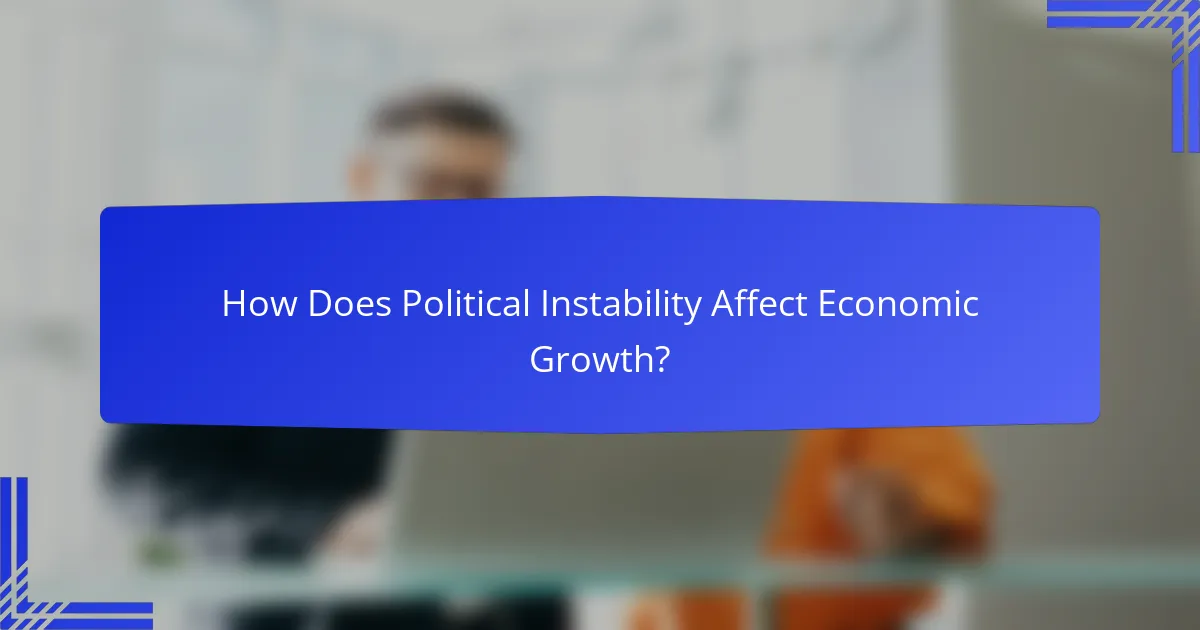
How Does Political Instability Affect Economic Growth?
Political instability significantly hinders economic growth by creating an unpredictable environment for businesses and investors. This uncertainty can lead to reduced investment, disrupted trade, and overall economic decline.
Negative impact on investment
Political instability often results in decreased foreign direct investment (FDI) as investors seek stable environments for their capital. Countries experiencing turmoil may see investment drop by substantial margins, as businesses fear for their assets and future profitability.
For instance, emerging markets with frequent political upheaval may struggle to attract the necessary capital to foster growth, leading to a vicious cycle of economic stagnation.
Disruption of trade
Trade disruptions are common in politically unstable regions, affecting both imports and exports. Uncertainty around government policies and regulations can lead to delays, increased costs, and even trade embargoes.
For example, countries facing political unrest may see their trade partners impose restrictions, further isolating them and hampering economic activity.
Increased inflation rates
Political instability can lead to increased inflation rates as supply chains are disrupted and production costs rise. When businesses face uncertainty, they may pass on these costs to consumers, leading to higher prices.
In some cases, inflation can escalate rapidly, eroding purchasing power and further straining the economy. Countries with unstable governments may experience inflation rates that fluctuate wildly, complicating economic planning.
Impact on consumer confidence
Consumer confidence typically declines during periods of political instability, as individuals become uncertain about their financial future. This lack of confidence can lead to reduced spending, which is vital for economic growth.
When consumers hold back on expenditures, businesses may see lower sales, prompting them to cut back on hiring or investment, which can further exacerbate economic challenges.
Reduction in GDP growth
The cumulative effects of political instability often result in a noticeable reduction in GDP growth. As investment wanes, trade is disrupted, inflation rises, and consumer confidence falters, the overall economic output suffers.
Emerging markets, in particular, may find their GDP growth rates plummeting from previously robust levels to stagnation or even contraction, making recovery a challenging prospect without stable governance.
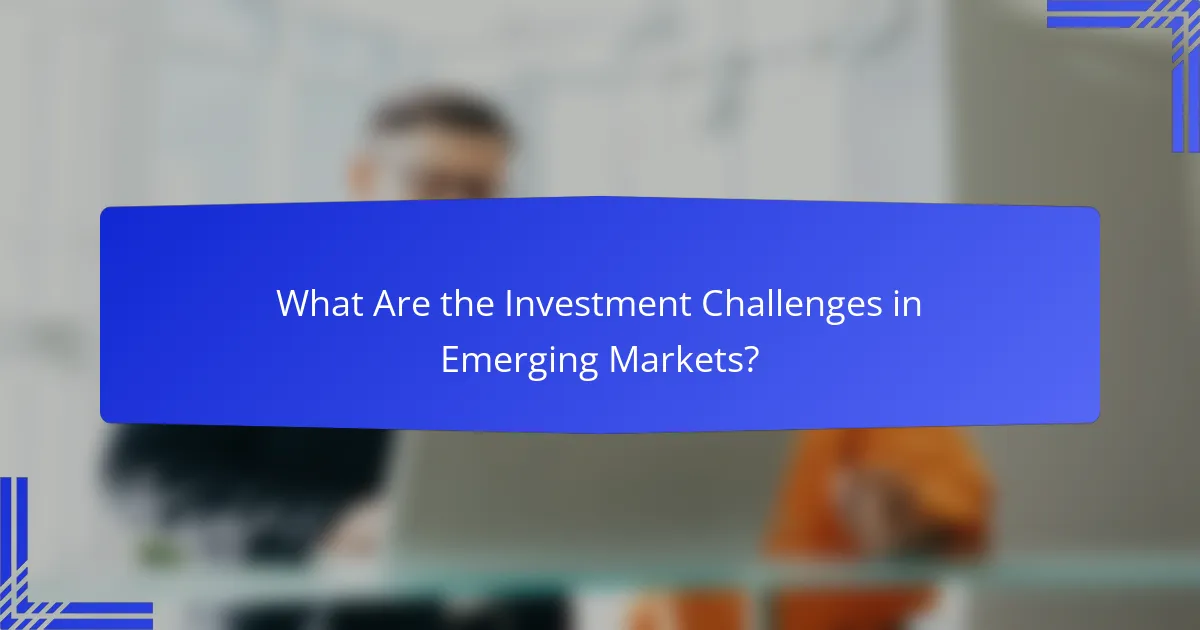
What Are the Investment Challenges in Emerging Markets?
Investment challenges in emerging markets often stem from a combination of political, economic, and infrastructural factors that can create uncertainty for investors. Understanding these challenges is crucial for making informed investment decisions in these regions.
Political risk assessment
Political risk assessment involves evaluating the stability of a country’s political environment and its potential impact on investments. Factors such as government changes, civil unrest, and policy shifts can significantly affect the investment landscape.
Investors should consider using tools like political risk indices or consulting local experts to gauge the political climate. Engaging with local partners can also provide insights into potential risks and help navigate the political landscape more effectively.
Currency volatility
Currency volatility refers to the fluctuations in exchange rates that can impact the value of investments in emerging markets. Rapid changes in currency values can lead to unexpected losses or gains for foreign investors.
To mitigate currency risk, investors may consider hedging strategies, such as forward contracts or options. Additionally, diversifying investments across multiple currencies can help reduce exposure to any single currency’s volatility.
Regulatory uncertainties
Regulatory uncertainties encompass the unpredictable nature of laws and regulations that govern business operations in emerging markets. Frequent changes in regulations can create challenges for compliance and operational planning.
Investors should stay informed about local laws and engage with legal experts to navigate the regulatory landscape. Building relationships with local authorities can also provide clarity on regulatory expectations and potential changes.
Infrastructure deficits
Infrastructure deficits refer to the lack of adequate facilities and services, such as transportation, utilities, and communication systems, which can hinder business operations in emerging markets. Poor infrastructure can increase costs and reduce efficiency.
Investors should assess the existing infrastructure before entering a market and consider potential investments in infrastructure development. Collaborating with local governments or private entities on infrastructure projects can also create opportunities while addressing these deficits.
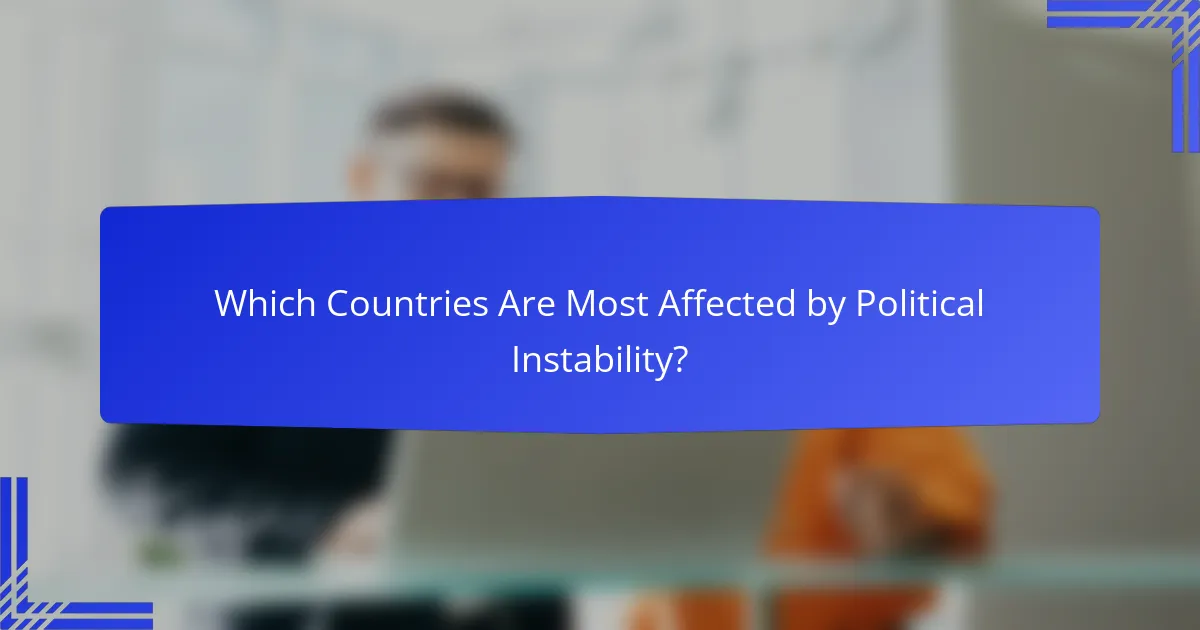
Which Countries Are Most Affected by Political Instability?
Countries experiencing significant political instability often face severe economic challenges, impacting growth and investment opportunities. Venezuela, Zimbabwe, Argentina, and Myanmar are among the most affected, each exhibiting unique issues that hinder their economic progress.
Venezuela
Venezuela is currently grappling with one of the most severe economic crises in the world, largely due to political turmoil and mismanagement. Hyperinflation has rendered the local currency nearly worthless, leading to widespread poverty and a collapse of essential services.
Investors face challenges such as expropriation risks and a lack of transparency in government dealings. The ongoing political conflict makes it difficult to predict future economic conditions, deterring foreign investment.
Zimbabwe
Zimbabwe has a history of political instability that has severely impacted its economic landscape. Land reform policies and government corruption have led to a decline in agricultural productivity, which was once the backbone of its economy.
Current investors must navigate a complex regulatory environment and consider the risks of currency volatility. The Zimbabwean dollar has experienced significant depreciation, making investments less attractive compared to more stable currencies.
Argentina
Argentina faces chronic political instability characterized by frequent changes in government and economic policy. This unpredictability has led to high inflation rates and a fluctuating currency, complicating investment decisions.
Investors should be cautious of potential capital controls and the risk of default on sovereign debt. Understanding local economic indicators is crucial for making informed investment choices in this challenging environment.
Myanmar
Myanmar has experienced significant political upheaval since the military coup in early 2021, leading to widespread civil unrest and economic disruption. The military’s control over the government has resulted in sanctions from several countries, further isolating the economy.
Foreign investors are currently facing a high level of uncertainty, with risks including regulatory changes and operational challenges. Engaging with local partners who understand the evolving political landscape can be a strategic advantage in navigating this complex market.

What Strategies Can Investors Use to Mitigate Risks?
Investors can mitigate risks associated with political instability by employing strategies such as diversification, engaging local partners, and utilizing political risk insurance. These approaches help to spread risk and provide a buffer against unforeseen events that could impact investments in emerging markets.
Diversification of investments
Diversification involves spreading investments across various asset classes, sectors, and geographic locations to reduce exposure to any single risk. By investing in a mix of equities, bonds, and real estate, investors can cushion their portfolios against volatility in specific markets.
For example, an investor might allocate funds across different emerging markets, such as Southeast Asia and Eastern Europe, rather than concentrating solely on one region. This strategy can help balance potential losses in one area with gains in another, enhancing overall portfolio stability.
Engaging local partners
Partnering with local businesses or experts can provide valuable insights into the political and economic landscape of a region. Local partners often have a better understanding of the regulatory environment and cultural nuances, which can help navigate challenges more effectively.
Investors should seek out reputable local firms that have established networks and a track record of success. This collaboration can lead to better decision-making and reduce the risks associated with unfamiliar markets.
Utilizing political risk insurance
Political risk insurance (PRI) protects investors against losses due to political events such as expropriation, political violence, or currency inconvertibility. This type of insurance can be crucial for investments in regions with a history of instability.
Investors should evaluate different PRI providers and understand the specific coverage options available. Policies may vary in terms of what risks are covered and the claims process, so thorough research is essential to ensure adequate protection for investments in volatile markets.
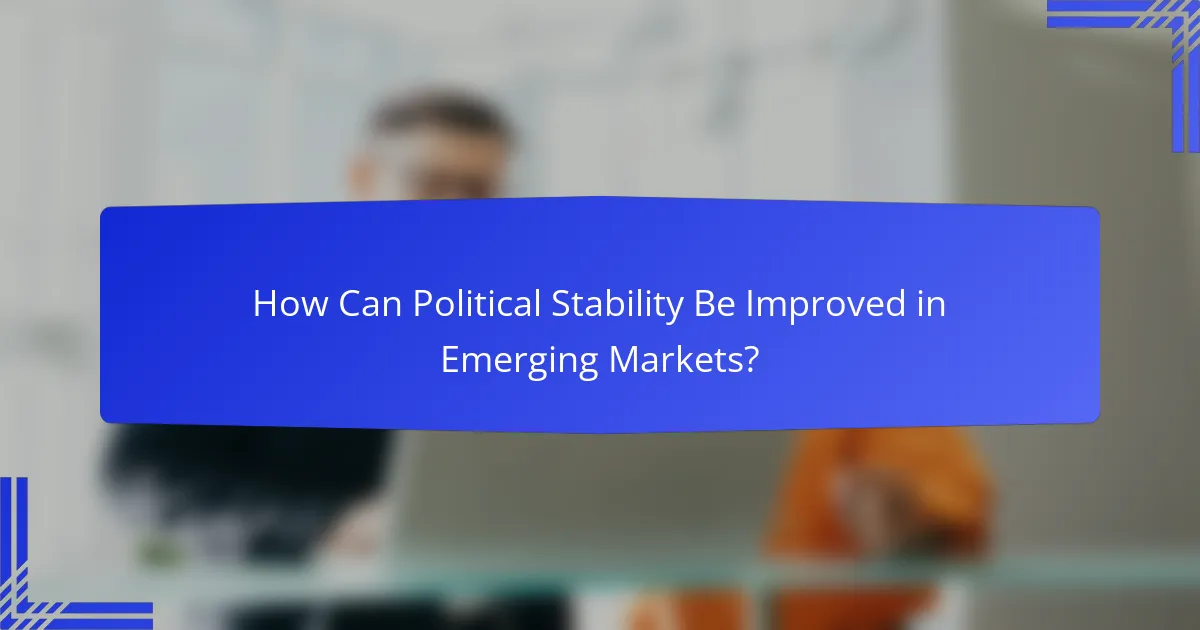
How Can Political Stability Be Improved in Emerging Markets?
Improving political stability in emerging markets involves fostering transparent governance, enhancing economic opportunities, and promoting social cohesion. Effective strategies include strengthening institutions, encouraging civic engagement, and ensuring fair economic policies.
Strengthening Institutions
Robust institutions are crucial for political stability. This includes establishing independent judicial systems, transparent electoral processes, and accountable governance structures. Countries can benefit from adopting international best practices and frameworks to enhance institutional integrity.
For example, implementing anti-corruption measures can significantly improve public trust and reduce instability. Countries like Botswana have successfully maintained stability through strong institutional frameworks that promote accountability.
Encouraging Civic Engagement
Active civic engagement is essential for fostering a stable political environment. Encouraging citizens to participate in decision-making processes can lead to more representative governance. This can be achieved through public forums, community organizations, and inclusive policy-making.
Emerging markets can implement outreach programs that educate citizens about their rights and responsibilities, which can strengthen democratic participation. Countries like Brazil have seen improvements in political stability through increased public involvement in local governance.
Ensuring Fair Economic Policies
Fair economic policies contribute to political stability by addressing inequality and promoting inclusive growth. Governments should focus on creating job opportunities, improving access to education, and ensuring equitable resource distribution. This can help mitigate social tensions and foster a sense of belonging among citizens.
For instance, countries that invest in social safety nets and support small businesses often experience lower levels of unrest. Implementing policies that prioritize economic equity can lead to a more stable political landscape in emerging markets.
